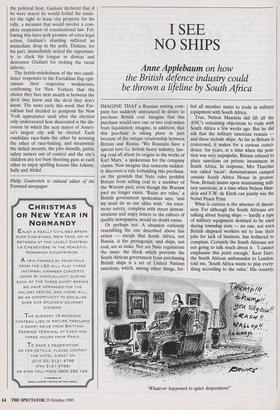I SEE NO SHIPS
Anne Applebaum on how
the British defence industry could be thrown a lifeline by South Africa
IMAGINE THAT a Russian mining com- pany has suddenly announced its desire to purchase British coal. Imagine that this purchase would save one or two coal-mines from liquidation; imagine, in addition, that this purchase is taking place in part because of the unique relationship between Britain and Russia. 'We Russians have a special love for British heavy industry, hav- ing read all about its origins in the works of Karl Marx,' a spokesman for the company claims. Now imagine that someone sudden- ly discovers a rule forbidding this purchase, on the grounds that Nato rules prohibit Britain from selling coal to a member of the Warsaw pact, even though the Warsaw pact no longer exists. 'Rules are rules,' a British government spokesman says, 'and we must do as our allies wish.' An enor- mous outcry, complete with street demon- strations and angry letters to the editors of quality newspapers, would no doubt ensue.
Or perhaps not. A situation curiously resembling the one described above has arisen — except that South Africa, not Russia, is the protagonist, and ships, not coal, are at stake. Nor are Nato regulations the issue: the block which prevents the South African government from purchasing British ships is .a set of United Nations sanctions, which, among other things, for- bid all member states to trade in military equipment with South Africa.
True, Nelson Mandela did lift all the ANC's remaining objections to trade with South Africa a few weeks ago. But he did ask that the military sanctions remain and these include ships. As far as Britain is concerned, it makes for a curious coinci- dence: for years, at a time when the posi- tion was very unpopular, Britain refused to place sanctions on private investment in South Africa. In response, Mrs Thatcher was called 'racist% demonstrators camped outside South Africa House in protest. Now, Britain insists upon maintaining mili- tary sanctions, at a time when Nelson Man- dela and F.W. de Klerk can jointly win the Nobel Peace Prize.
What is curious is the absence of discus- sion. For although the South Africans are talking about buying ships — hardly a type of military equipment destined to be used during township riots — no one, not even British shipyard workers set to lose their jobs for lack of business, has bothered to complain. Certainly the South Africans are not going to talk much about it. 'I cannot emphasise this point enough,' Kent Durr, the South African ambassador to London, told me, 'South Africa wants to play every- thing according to the rules.' His country, `Whatever happened to quiet desperation?' he said, was looking forward to joining the community of responsible nations, and would therefore not dream of violating anyone's scruples or breaking anybody's trade regulations. 'We honour the fact that the British are law-abiding people, and we respect their respect for the law.' Having said that, he also noted that the South African navy holds a special place in its heart for the Royal Navy. The two forces have fought a few wars together, and share some of the same traditions; until the 1970s, the Royal Navy had a base in the South African port of Simonstown. 'It is no secret that the South African navy is in love with the Royal Navy,' said the ambassador. All things being equal, the South African navy would like to get closer to the Royal Navy,' All things being equal, in other words, the South African navy would like to buy its new ships from Britain. South Africa's naval requirements have changed South Africa is no longer 'at war' with an entire continent to the north — and Britain, even laying sentimental attach- tnents aside, does (according to the South Africans) produce exactly the sort of light, cost-effective ships which South Africa now believes it needs to patrol its coasts. Still, while declaring its interests, South Africa is not going to push too hard and risk any further opprobrium. But the British Government, which is meant to be doin its bit to win orders for its beleaguered defence industry, is not going to make a fuss either. When questioned, the Defence Ministry replies that it has no objection to people talking to one another: and there have been, it is acknowledged, detailed discussions about this particular subject. South African naval delegations, which included ANC members, have paid visits to London, where they were warmly received. Everyone agrees that, just as soon as it is possible — just as soon as there is a black-led government in South Africa, probably next spring — military sanctions will be lifted and the purchase of ships can be discussed for real.
If, that is, it is not too late. The arrival of a black government may not happen as planned — so far, very little has happened as planned in South Africa — and South Africa, although its ambassador to London is too polite to say so, does have other options. Few East European countries have many qualms about selling to South Africa, particularly since their defence industries are usually in even worse shape than Britain's: not long ago, the South African navy bought a ship from Ukraine. Germany is notoriously good at selling far more sus- pect goods to far more unpleasant coun- tries, and so is France. Of course, the deal could also come too late in another sense. I rang Swan Hunters, one of the shipyards whose fortunes might be dramatically affected if South Africa decides to make its purchase in Britain. `You do realise,' the man speaking for Swan Hunters' management barked down the telephone line, 'we're in receivership.' Neither of the two remaining directors was available for comment. 'Just say that we're very pleased that the South Africans are interested in British ships.'
Yet it is not as if anyone is planning marches to 'Save Our Shipyard' either. Yes, Swan Hunters can make the sort of ship South Africa requires, a trade union official told me, but no, he didn't feel very optimistic about it: 'We don't think South Africa will deal with us anyway, not with a company in receivership.' Swan Hunters has shed 902 workers since May, and more will go after the first of the yard's remain- ing three frigates is finished in November. Within a year, all orders will have been completed, he explained, and, barring an outside investor, all workers will be laid off as well. 'But no, no, we wouldn't call for the lifting of sanctions, we're against the apartheid state.' Clearly, the news of apartheid's demise has not yet reached Tyneside.



































































 Previous page
Previous page